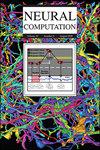内视网膜网络如何塑造神经节细胞的感受野?计算研究
IF 2.7
4区 计算机科学
Q3 COMPUTER SCIENCE, ARTIFICIAL INTELLIGENCE
引用次数: 0
摘要
我们考虑了一个视网膜内部基本连接模型,在这个模型中,双极细胞和羊膜细胞相互连接,两种细胞类型都投射到神经节细胞上,调节它们对大脑视觉区域的反应输出。我们推导出视网膜神经节细胞对刺激的时空响应分析公式,其中考虑到了羊膜细胞抑制的影响。这一分析揭示了网络的两个重要功能参数:(1) 双极细胞和肾上腺素细胞之间的相互作用强度;(2) 这些反应的特征时标。这两个参数对视网膜神经节细胞对光反应的时空特征具有深远的综合影响。通过刺激神经节细胞和视网膜神经元细胞亚类上表达的兴奋性 DREADDs(专门由 Designer Drugs 激活的 Designer Receptors),从而以复杂、纠缠的方式改变视网膜内部网络对视觉刺激的活动,忠实再现了药物遗传学实验结果,从而证实了该模型的有效性。我们的数学模型使我们能够以实验无法实现的方式探索和破解这些复杂的效应,并为视网膜动力学提供了新的见解。本文章由计算机程序翻译,如有差异,请以英文原文为准。
How Does the Inner Retinal Network Shape the Ganglion Cells Receptive Field? A Computational Study
We consider a model of basic inner retinal connectivity where bipolar and amacrine cells interconnect and both cell types project onto ganglion cells, modulating their response output to the brain visual areas. We derive an analytical formula for the spatiotemporal response of retinal ganglion cells to stimuli, taking into account the effects of amacrine cells inhibition. This analysis reveals two important functional parameters of the network: (1) the intensity of the interactions between bipolar and amacrine cells and (2) the characteristic timescale of these responses. Both parameters have a profound combined impact on the spatiotemporal features of retinal ganglion cells’ responses to light. The validity of the model is confirmed by faithfully reproducing pharmacogenetic experimental results obtained by stimulating excitatory DREADDs (Designer Receptors Exclusively Activated by Designer Drugs) expressed on ganglion cells and amacrine cells’ subclasses, thereby modifying the inner retinal network activity to visual stimuli in a complex, entangled manner. Our mathematical model allows us to explore and decipher these complex effects in a manner that would not be feasible experimentally and provides novel insights in retinal dynamics.
求助全文
通过发布文献求助,成功后即可免费获取论文全文。
去求助
来源期刊

Neural Computation
工程技术-计算机:人工智能
CiteScore
6.30
自引率
3.40%
发文量
83
审稿时长
3.0 months
期刊介绍:
Neural Computation is uniquely positioned at the crossroads between neuroscience and TMCS and welcomes the submission of original papers from all areas of TMCS, including: Advanced experimental design; Analysis of chemical sensor data; Connectomic reconstructions; Analysis of multielectrode and optical recordings; Genetic data for cell identity; Analysis of behavioral data; Multiscale models; Analysis of molecular mechanisms; Neuroinformatics; Analysis of brain imaging data; Neuromorphic engineering; Principles of neural coding, computation, circuit dynamics, and plasticity; Theories of brain function.
 求助内容:
求助内容: 应助结果提醒方式:
应助结果提醒方式:


